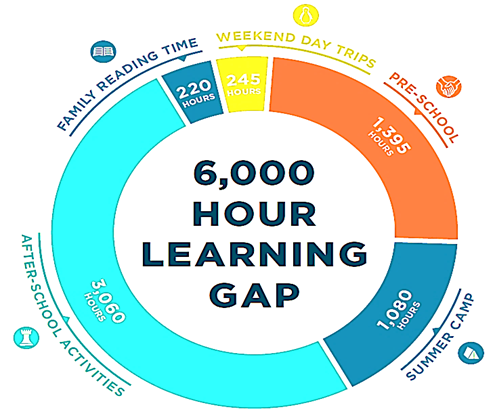According to ExpandED a nonprofit dedicated to closing the learning gap by increasing access to enriched education experiences, middle-class kids, by sixth grade, will have likely spent around 6,000 more hours learning than children born into poverty. Learning time is a resource that is not equally distributed. Students are going to learn how to problem-solve, persist, create, and read at home and through after-school activities. Parents stressed by poverty are far less likely to help make sure their children have the same experiences.
This gap isn’t just missed leisure and fun time. It shows a large inequity in exposure to informal learning settings and opportunities. Each summer, teachers warn about the “summer slide,” where the low-income students end up losing around two months of ground when it comes to their learning. On the other hand, their middle-income peers have likely spent that summer taking part in informal learning opportunities, like camping, reading at the library, sports camp, museum trips, and so on, and this helps them to soar ahead.
This chart gives you a breakdown of what can affect this learning gap.

This is why expanded learning opportunities or ELOs are so important. High-quality summer or afterschool educational experiences that happen outside of the regular school day are critical to combat learning loss. These are meant to build upon what students are learning during the school day, and give them a new and exciting way to interact with a subject. This can help solve the problem of lost work productivity, poor academic achievement, and unsupervised kids for parents.
While classroom learning is an important part of your tween’s education, it shouldn’t be the only part of their education. There is a lot that your tween will learn in the traditional classroom, but if you want to make sure that they have a well-rounded education, you want to make sure that you provide them with extracurricular and after-school activities.
Extracurricular activities aren’t just as good for their overall development. Students experience a lot of pressure during their tests, and there is the pressure of doing well in their classes. With conditions like these, they must have some other activities. You can’t expect them to only read books and become smart.
Sometimes parents choose not to let their students take part in extracurricular or sports that the school has to offer. Sometimes the student doesn’t feel like they need to take part in these things. I’m here to tell you that you need to let and encourage your learners to take part in extracurricular activities. These activities won’t distract from their studies, in fact it makes them better more well-rounded individuals.
Studies have found that students who take part in extracurricular activities enjoy numerous benefits. They are growing, learning, and more importantly, having some fun. To understand why you should make sure your student takes part in extracurricular activities, let’s go over some of the biggest benefits.
1. Academics
Multiple studies have found that students who take part in after-school activities are more likely to get better grades and will have a better work ethic.
2. Learn New Skills
Fundamentally, extracurricular activities give students a chance to learn something new that will stay with them for the rest of their life. This skill could be the basis for a hobby or a passion that helps to enrich their lives for many years to come. Everything from learning an instrument or playing sports could lead to several hours spent doing things that they enjoy. Besides that, these activities can instill personality traits and skills that can help them in all walks of life.
3. Time Management
Having more priorities besides family and school can help your tween learn how to best manage their time to make sure that they get all of their work done. They will learn how to balance school life with their after-school club. This is going to create the foundation of skills they need and will benefit them later on in their education and life.
4. Social Skills and Friendships
In the traditional classroom, there is only so much socializing that can go on, but extracurricular activities provide more chances for them to bond and form lasting friendships. Extracurricular activities provide your child with a chance to engage with other children in a social setting. Away from the classroom, kids have a good chance to mix with other like-minded children while doing something they all like. This helps them to develop social skills, become confident with communicating in groups, and to meet new friends. The activities can also help them develop confidence and self-esteem.
About the author
Joshua Sneideman is the VP of Learning Blade®, an online STEM and Computer Science Career awareness program utilized around the country to improve students understanding of the career pathways in STEM in grades 5-9. Josh is a former Albert Einstein Distinguished Education Fellow and author of numerous STEM education books including his latest release Parenting Tweens: Successfully Navigating the Middle School Years - (link for the book if possible - https://www.amazon.com/Parenting-Tweens-Successfully-Navigating-Middle-ebook/dp/B09MQZTW52)











